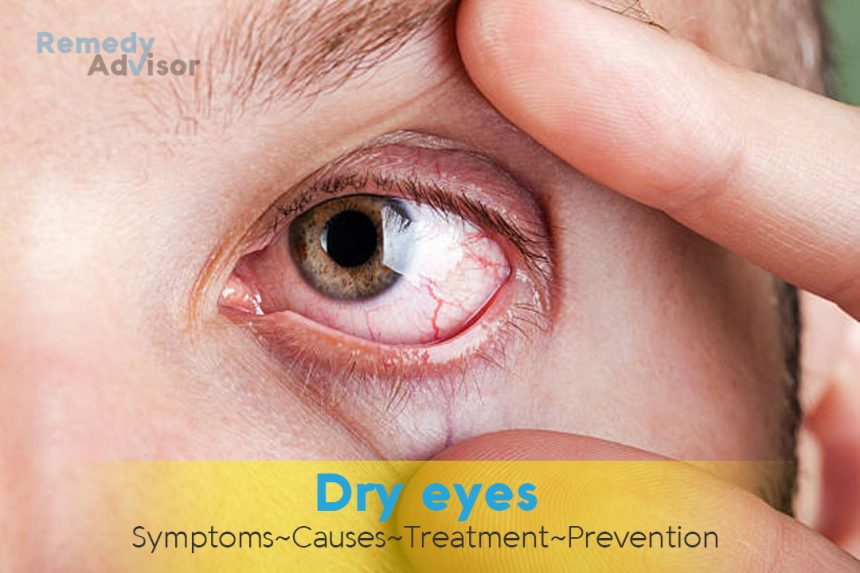What is it
Your eyes are regularly bathed by tears, which help lubricate the blinking action of the eyelids and wash away any debris that lodge on the cornea the clear protective coating on the eye. One of the most common external eye complaints among people over age 40 is dry eye syndrome, or keratoconjunctivitis sicca (KCS), which produces an itchy, gritty feeling in your eyes. Surprisingly, overflowing tears are often a symptom of the condition, produced in response to underlying dryness.
Dry eye is more likely to occur with age because the tear glands tend to shrink. It is also more common in women, especially after menopause.
Symptoms
- Excessive tearing, persistent scratchy and/or stinging sensation in the eye.
- Redness, swelling, or irritation (as if some gritty foreign body is under the eyelid).
- Blurred vision.
What causes it
The discomfort of dry eyes is usually due to insufficient tear production by the lachrymal glands. Certain eyelid abnormalities or surface infections may also be responsible. The problem can also occur as a side effect of certain medications (diuretics and antidepressants), and it can be associated with rheumatoid arthritis. It also occurs in Sjogren’s syndrome, a type of autoimmune disorder in which die glands th at produce lubricating solutions including those for the mouth and vagina as well as the eyes are attacked.
The environment can also contribute to the problem. Too much exposure to direct sunlight or extremes of wind and low humidity may quickly dry out the eyes, and in arid parts of the country many people develop dry-eye problems because tears evaporate quickly in the heat. When this happens, tears quickly flood the eyes as a protective measure, blurring vision in the process and leading people to mistakenly think the excessive tearing is a condition called wet eye, or epiphora. In reality, the excessive tears are masking the problem.
High altitudes, air conditioning, and air pollution can also contribute to dry eyes by increasing the rate of tear evaporation. Soft contact lenses can also have the same effect.
What if you do nothing
Dry eye may clear on its own if you are able to avoid or remove the source of the problem. But persistent dryness increases the risk of infection and can damage the eyes, so professional diagnosis is a good precaution in all but the mildest cases.
Home remedies
Use “artificial tears” eyedrops on a regular basis
In some-cases this may mean two drops, three to four times daily, of a nonprescription tear preparation. These nonprescription drops are often completely effective. Some solutions are thicker than others, but all can help protect the delicate front surface of the eye. Try several solutions and see which one works best for you. Be aware that most products will lose their effectiveness within an hour after application.
You may find that while the thicker gel lubrication solutions relieve symptoms for a longer time, they may cause slightly blurred vision for a short period after they’ve been applied. (A good time to use the thicker products is at night, just before going to bed.)
Some people have allergic reactions to the preservatives in these products; if you do, look for preservative-free artificial tears. As noted on the package, these products must be kept refrigerated after opening.
Try a cooling soak
With a cool, wet facecloth, soak your closed eyes for three to five minutes. This helps constrict the blood vessels and ease the gritty sensation.
Splash water in your eyes
This will help to quickly relubricate your eyes. (In addition, see the prevention tips below.)
Prevention
Protect your eyes from the wind. If you find that your eyes dry out because of high winds, be sure to wear goggles or glasses with protective side shields. These are available in many pharmacies as well as outdoor-equipment stores.
Avoid smoky environments
Smoking dries the eyes, as does secondhand cigarette smoke.
Keep alcohol and caffeine intake to a minimum
Both types of beverages have a diuretic effect that can exacerbate dryness.
Alternate contact lenses with eye glasses
If you work or live in a low-humidity environment, this will help ease the strain of dry eyes brought on by daily-wear or extended-wear lenses. When you wear your lenses, be sure to use rewetting drops at the first sign of dryness.
Humidify your home
Cold winter air coupled with indoor heat can produce an extremely dry environment, particularly if rooms are overheated. A home humidifier can help reduce dryness, as can turning down the heat.
Break up your computer time
As you work in front of a computer screen, you tend to blink less, which can cause eyes to become drier. Taking a break every hour or so can help prevent excessive dryness.
Speak to your physician about your medications
Certain antihistamines, oral contraceptives, and antidepressants can contribute to dry eye. If it’s possible, try an alternative drug that doesn’t produce this particular side effect.







